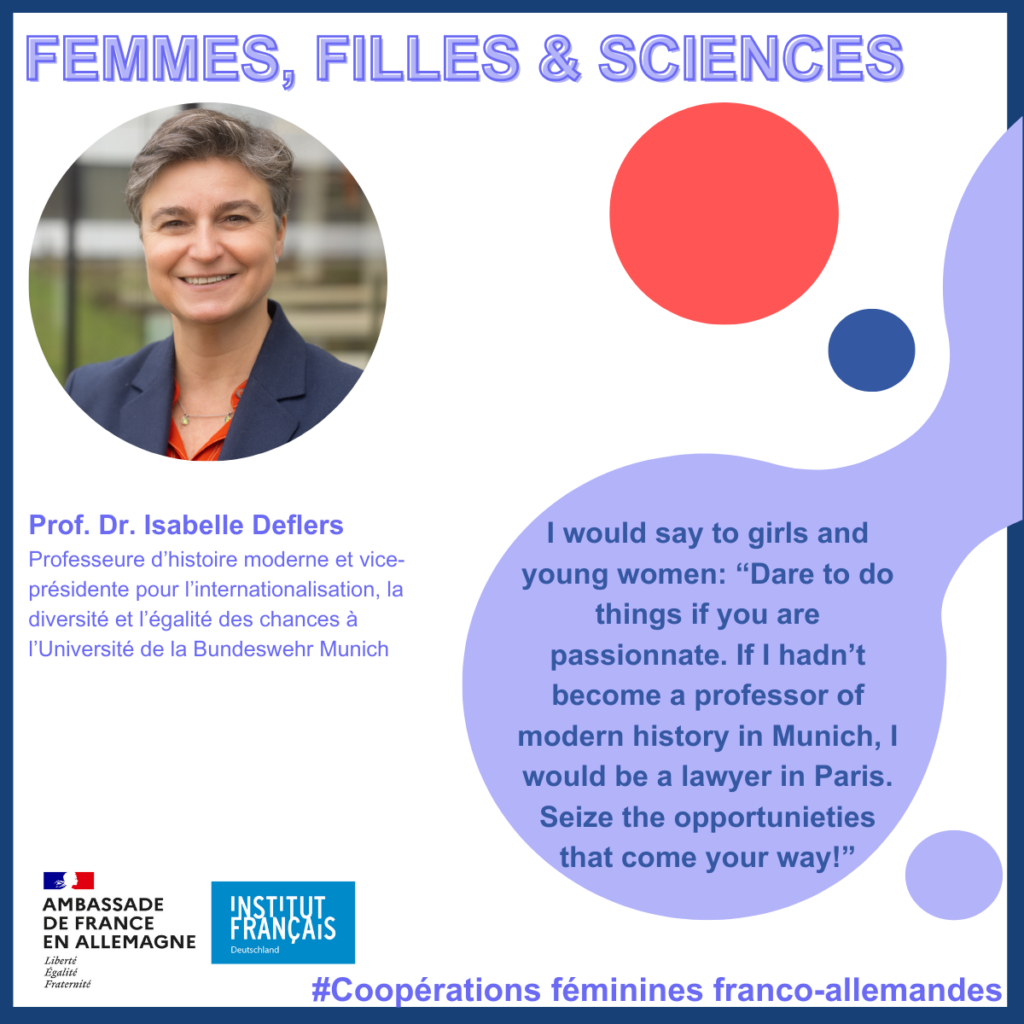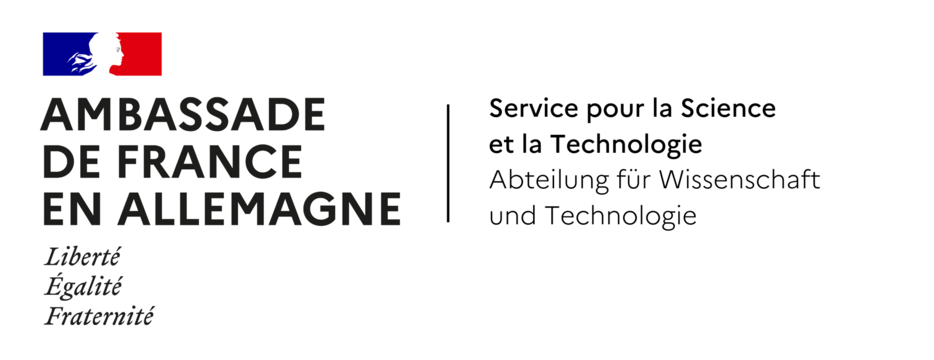
Dare to do things if you are passionnate and seize the opportunieties that come your way!
Série Femmes, filles et sciences
Entretien avec Isabelle Deflers.
Le Service pour la science et la technologie de l’Ambassade de France en Allemagne met en lumière des femmes scientifiques et des managers de projets, en particulier des coopérations franco-allemandes scientifiques féminines, contribuant ainsi à la déclinaison par l’Ambassade de France en Allemagne de la stratégie internationale de la France pour une diplomatie féministe (2025-2030). Plus d’informations : https://de.ambafrance.org/Strategie-internationale-de-la-France-pour-une-diplomatie-feministe-2025-2030
Prof. Dr. Isabelle Deflers est professeure d’histoire moderne au Département des sciences sociales et de l’État de l’Université de la Bundeswehr de Munich et depuis le mois de janvier Vice-Présidente de son Université dans le domaine de l’internationalisation, la diversité et l’égalité des chances.
Prof. Dr. Isabelle Deflers, Dr. Anna Axtner-Borsutzky (Université Ludwig-Maximilian de Munich) et Dr. Marília Jöhnk (Université Goethe de Francfort-sur-le-Main) ont obtenu un financement du Bundesministerium für Bildung und Forschung (BMBF) pour leur projet de recherche « Lost in Archives » sur des femmes invisibles et oubliées qui ont été actives au 18ème et au début du 19ème siècle dans des domaines dominés par les hommes (théâtre, critique littéraire, littérature militaire). Les réalisations innovantes de ces femmes seront mises en valeur de manière publique, notamment sous la forme d’une exposition itinérante, de podcasts et d’un roman graphique.
Plus d’informations : https://www.unibw.de/geschichte/prof/fnz/pers/deflers/projekt-lost-in-archives/m_lost-in-archives-auf-der-suche-nach-unsichtbaren-frauen
Isabelle Deflers a également créé un réseau de recherche en mars 2024 traitant du « militaire, guerre et genre/diversité » (Militär, Krieg und Geschlecht/Diversität, MKGD). Le réseau de recherche MKGD vise à fournir un espace académique et un cadre institutionnel pour les recherches réalisées sur le militaire, la guerre et le genre/ la diversité non seulement en Allemagne mais aussi dans le monde entier. L’objectif est de promouvoir systématiquement l’étude de la relation entre le genre, la diversité, le militaire et la violence en tant qu’approche et sujet de recherche par le biais de la coopération interdisciplinaire et internationale.
Plus d’informations : https://mkgd.hypotheses.org/research-network
Can you introduce yourself, and your research?
Isabelle Deflers: My name is Isabelle Deflers. I studied law in Paris and have always been very interested in reflecting on the concepts of state law. So, I studied philosophy, law, sociology, and especially the history of law. I completed my master’s degree at the University of Osnabrück in Germany and my PhD in the history of law under the supervision of my master’s director, focusing on the conception of law and the state in the works of Philipp Melanchthon, a major reformer alongside Martin Luther. After my PhD, I returned to France to pursue the training to become a lawyer at the bar school in Paris for a year. I then heard about a research assistant position at the University of Heidelberg, applied, was accepted, and even managed to complete law school. I worked there for five and a half years. I also received a scholarship called the “Olympia Morata stipendium” for postdoctoral women, which allowed me to spend half of the year in Paris, in the archives and libraries, and to make significant progress on my research project. Then, in 2010, I went to the University of Fribourg, where I held several positions and stayed for 10 years. I had two children during that time. I completed my habilitation in 2013 while pregnant with my first child. Between 2013 and 2020, I applied for professorships, which was not easy. Fortunately, I had the position in Fribourg because I wasn’t sure if my academic career would continue. It was a very difficult period in my professional life. In 2020, I obtained a professorship at the University of the Bundeswehr in Munich. I am now a professor of modern history in Munich since October 2020. Last January, I was also appointed Vice-President in charge of Internationalization, Diversity and Equal Opportunities.
What is your connection with Germany?
Isabelle Deflers: My connection with Germany is truly due to chance and encounters. Initially, I had no intention of going to Germany, even if it was my first foreign language in high school. I wanted to go to England or the Netherlands, but I ended up going with a friend to Osnabrück on Erasmus because there were two spots available. Upon arrival, I thought I wouldn’t last a week, but I ended up staying for six years. Later, I have been appointed a member of the scientific council at the Université Franco-Allemande in Sarrebruck, and I am also a member of the evaluation committees for bi- und trinational projects at the ANR-DFG. My research is also focused on Franco-German relations. Today, Franco-German relations are very important, and the President of the University of the Bundeswehr also chose me as Vice-President because I am French native Speaker.
Is gender a subject in your research?
Isabelle Deflers: In 2024, I secured funding from the Bundesministerium für Bildung und Forschung (BMBF) for my research on invisible women. These are women from the 18th century and the Beginning of the 19th century who worked in male-dominated fields and never received recognition, or who had some renown at the time for their achievements but disappeared from historiography during the 19th and 20th centuries, when the grand national histories of various countries were written. These histories were primarily written by men and focused on the “history of great men”. This project had been on my mind for nearly ten years. I always give the example of Émilie du Châtelet, a noblewoman with considerable freedom and wealth, who was able to create her own laboratory, was friends with Voltaire, and owned a large castle. She had access to the literary circles of her time. She was exceptionally brilliant in physics, translated all of Newton’s works, and was recognized in her era for her knowledge. However, this was not the case for many other women of that time. I am interested in women translators—who were they? How did they benefit from their knowledge and contacts? This research project requires a lot of time in archives and libraries to find the works published at the time and their translations. I chose the field of military literature because it is also of great interest to me. I applied to the BMBF’s call for proposals with two postdoctoral colleagues who also work on the visibility of women in literature. We will have PhDs, but we are also creating podcasts, short videos, and we aim to develop an exhibition and a graphic novel about these invisible women.
In addition, together with other colleagues, including Professor Karen Hagemann, we have set up in March 2024 a very successful international Research Network on “Military, War and Gender/Diversity” (MKGD), with more than 300 members.
Has gender impacted your experience as a woman in research?
Isabelle Deflers: Yes and no. This field is very male-dominated, and many men have taken me under their wing to help me, including prominent specialists in the field. But there are also many who have never really taken me seriously. When I applied for professorships, I was invited for interviews only twice, and I am sure that being a woman, French, and having a background in law rather than history played a role. However, some women have served as role models for me. For example, when I arrived at the University of Heidelberg in October 2004, there was only one female professor who had just been appointed, Mrs. Madeleine Herren—an amusing last name in this context. She had a family and children, which showed me that it was possible to successfully combine the two.
Do you advocate for women in research?
Isabelle Deflers: Yes, because I have benefited from programs and scholarship as a young woman, and now I try to do the same to the new generation. Indeed, I have benefited from many scholarships, and I believe this is due to both the quality of my work and the fact that I was a young foreign woman. At the University of Heidelberg, I applied for a program supporting female postdoctoral researchers from the Foundation Robert Bosch “Fast-Track-Förderungsprogramm”. For two years, we received a mobility grant and participated to coaching-workshops. What was truly wonderful. The idea was to encourage research among female postdocs and to network them. So now, I try to give back by engaging in mentoring programs for doctoral and postdoctoral students for several years, aiming to support, advise, listen to them, connect them with others, or review their application files. There are increasingly more programs that support female researchers, whether at the doctoral or postdoctoral level, aimed at increasing the number of women who stay in academia, as it has been noted that many women leave after completing their PhDs. I also try to support women as a researcher, meaning that during recruitment campaigns, I ensure that female candidates with equal qualifications are well supported. At my university, the University of the Bundeswehr in Munich, there are entire faculties with no women—no female students, doctoral candidates, postdocs, or professors. The only women are the secretary and the cleaning staff. I always remind my colleagues that the most important thing is to have a diversity of talents to complement each other, support one another, and work better together because the aim of all these incentives is to improve our working methods and therefore our performance by combining our skills and talents.
Did you notice differences between France and Germany in terms of gender?
Isabelle Deflers: The university structure is very different between the two countries. In France, academics are indeed paid much less, but there are positions like “maître de conferences” that do not exist in Germany. In France, there are women everywhere, including in high-ranking positions such as laboratory directors and university presidents. In Germany, there are few female professors, 29% of women in these roles in 2023 for example. So, there is a significant difference in the presence and visibility of women between France and Germany; that is very clear. When I arrived at the University of Heidelberg, not only was Madeleine Herren the only female professor, but I was also the only female postdoc. All my other colleagues were men, most of them already married, often with school teachers—women who worked part-time and took care of the children in the afternoon, typical of the traditional German model.
What advice would you give to girls and young women?
You have to dare to do things, not be afraid, and go for it if you are truly passionate. If I hadn’t become a professor of modern history, I would be a lawyer in Paris today. My life has completely changed. I seized the opportunities that came my way. Sometimes I would have doubts. Even the position of Vice-President, at first, I refused. I thought I had just arrived in the University and wouldn’t be able to handle it. But there’s no reason I couldn’t do it and why we can’t do it. The second thing is to surround yourself with people who radiate a positive energy. All these support programs are fantastic. You absolutely must sign up for them; they are available everywhere, in all universities now. The third thing is to never lose sight of the fact that we do this because we enjoy it. If you are too unhappy, if you are terrified of your boss, can’t sleep, or have stomach ulcers because you are so miserable, you need to make a change. There are real instances of violence within universities due to the pyramidal structure we mentioned earlier. University professors, especially those who hold chairs, are really put on a pedestal. They have a lot of power over your academic career, and if you lose your passion because of that, you need to do something else or find people willing to support you. There are plenty of people and associations that help now. For example, in history, there is the major association of German historians that now has a working group focused on discrimination, violence, abuse of power, and also sexual abuse. So never lose sight of the fact that you have to love your job!
Entretien réalisé en français le 14 mars 2025 par Noela MULLER,
du Service pour la Science et la Technologie de l’Ambassade de France en Allemagne.

